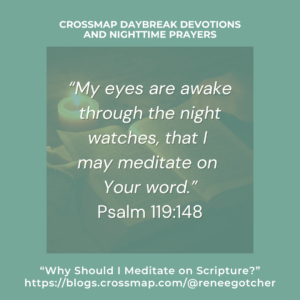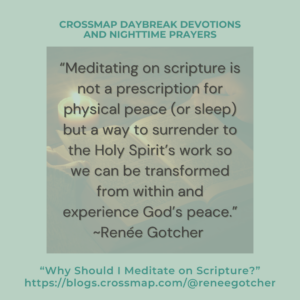Why Should I Meditate on Scripture?

Transforming Truth:
“My eyes are awake through the night watches, that I may meditate on Your word.”
— Psalm 119:148
The sliver of moonlight penetrating a thin gap between the slightly short blackout curtains on my bedroom window grew more intense as drawn-out minutes of sleeplessness turned into hours. I lay wide awake—yet again—trying to focus on anything but the sensation of my rapidly beating heart, the dread-filled worries weighing heavily on my chest, and that ever-brightening moonlight filling the room.
Was it a full moon taunting my insomnia? Or had my eyes adjusted so well to the dark, they considered the tiny intrusion of moonlight to be a wake-up call? Either way, I had a sinking feeling I was not going to fall asleep anytime soon.
Nights like this, unfortunately, became routine as I battled chronic physical anxiety symptoms for the first time 12 years ago. Back then, I couldn’t control how my body felt from day to day, sometimes minute to minute, but I knew I could control where I put my mind’s attention. I had memorized plenty of scriptures to recite in prayer to combat anxious thoughts, however, I wasn’t always soothed into a peaceful slumber.
How do I meditate on scripture?

Whether you’ve grown up in the Christian church or are new to the faith, you’ve likely heard that you should read, study, memorize, and meditate on God’s word. However, you might wonder what it looks like to meditate on scripture, and why it’s just as important as reading, studying, or memorizing key passages.
We live in a culture that gives a starkly different definition for the practice of meditation than what was described by biblical authors like King David, author of many Psalms that refer to it. Meditating on God’s word is emphasized throughout scripture, and it always means an active engagement and exercise of the mind to enhance our understanding of God’s word and its application—not disengagement or emptying the mind.
A practice to help you meditate on scripture
When I was struggling with anxiety-induced insomnia, my Christian counselor recommended I try reciting Psalm 23—a six-verse chapter I had memorized years before—more thoughtfully when I struggled to sleep. She suggested taking one verse at a time and putting an emphasis (reflective pause) on just one word each time I made my way through the passage, then repeating the verse with an emphasis on the next word, then the next.
This exercise helped me contemplate each verse more carefully and consider the weight of each word in conveying the overall message. For example, “the Lord is my shepherd” (Psalm 23:1a) is more than a figurative description when you consider that the (the one and only) LORD (Jehovah, the proper name of the one true God) is (yesterday, today, and forever) my (personal, intimate) shepherd (keeper and protector who tends to my provision). What a powerful statement it becomes!
Psalm 23 became a source of deeper peace, taking my focus off the troubling physical symptoms I was fighting and steadying my spirit with the powerful truths packed into each verse. Though the valley I was experiencing felt extremely dark and desperate, Psalm 23 reassured me that I could rest in the care of my Good Shepherd, who was leading me, providing for me, sustaining me, protecting me, and walking with me through it all.
 Meditate on scripture for mind renewal, not a quick fix
Meditate on scripture for mind renewal, not a quick fix
Friend, I know what it’s like to hope and pray that reciting a few key Bible verses will finally silence an unrelenting storm of anxious thoughts. What the psalmist described in Psalm 119:148 makes me think he was also familiar with this struggle. However, he turned his focus to the benefit of being awake through “the night watches”—the opportunity to meditate on God’s word.
Meditating on scripture should not be another grab for control over our circumstances, though—it’s an act of release. It’s not a prescription for physical peace (or sleep) but a way to surrender to the Holy Spirit’s work so we can be transformed from within and experience God’s peace.
The prophet Isaiah wrote: “You will keep him in perfect peace, whose mind is stayed on You, because he trusts in You” (Isaiah 26:3). It’s important to read, study, and memorize scripture, but let’s also make time to meditate on it, contemplate its meaning, and keep our minds fixed on His truth so that we can experience His peace, which is a reflection of our trust in Him despite difficult circumstances.
Nighttime Prayer:
Almighty Father, I’m so grateful that Your word isn’t simply an ancient book—it lives and breathes with Your divinely inspired words. Your word is active and powerful (Heb. 4:12), providing a lamp to my feet and path (Psalm 119:105) and transforming me day by day (2 Cor. 4:16). I thank you that even on a sleepless night, I can meditate on scripture and be comforted by Your perfect peace, Your faithful presence, and Your transforming truth. I desire to spend more time contemplating all that scripture teaches me about who You are, who You say I am, and how I can now live because I am a new creation in Christ. Help me set aside focused time to meditate on Your word and allow the Holy Spirit to give me a deeper understanding and the wisdom to apply it in my daily life. In Jesus’ name, amen.
Questions for Reflection
- Did you learn to memorize scripture as a child? If so, do you still recall key verses when they apply to current circumstances?
- Do you currently try to memorize scripture? Or do you struggle with scripture memorization?
- Do you have a favorite method to help you memorize and meditate on God’s word, such as listening to songs with scripture in them, displaying art with key verses to prompt you, or another practice that helps you actively contemplate scripture?
Join the Conversation: Share your responses to a reflection question or thoughts about what it means to you to meditate on scripture in the comments section.
*This devotional was published on Crossmap.com as part of the DayBreak Devotions series.


